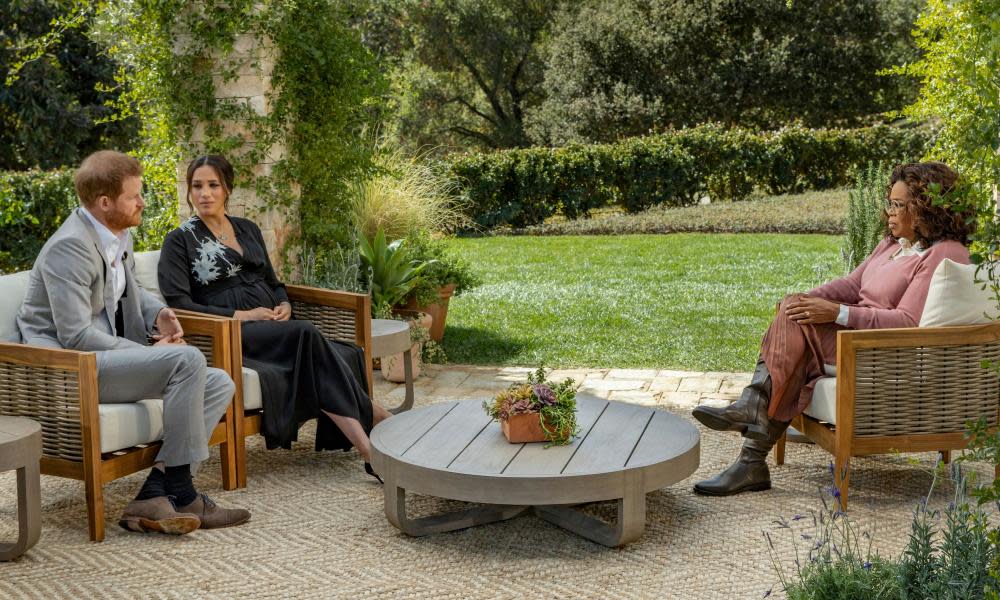The Guardian view on Harry and Meghan: heavy is the head that wears the crown

Of royalty, Walter Bagehot wrote in The English Constitution, “we must not let in daylight upon the magic”. To preserve the charm and mystery of the monarchy required its workings to be shielded from the public. In lifting the veil, Prince Harry has spoken of a dysfunctional palace, where more than a whiff of racism lurked and suicidal anguish was dismissed. The interview that the Queen’s grandson and his wife, the Duchess of Sussex, gave to their friend Oprah Winfrey painted a picture of a Britain under a thin aristocratic crust that was wreathed in a “toxic atmosphere” in which the Windsors were either willingly or unwillingly trapped. Royal life, the couple said, was stalked by the fear of the tabloid press. These charges cannot be treated lightly. Prince Harry is the ultimate palace insider, with a ringside seat at the royal circus for decades.
The monarchy’s soft power rests upon the great social – and political – pressure not to embarrass the Queen. The royal family has been obliged to protect her interests and shield her from criticism, aware that their fortunes are tied to preserving the monarchy’s hold over people. Prince Harry has broken this rule, and he seems to care little that he has done so. Like his mother, Diana, Princess of Wales, he outmanoeuvred the palace because he was willing to bare his soul in public. Princess Diana’s fury with her husband and his betrayals did not threaten “the firm” until she died. The prince has fired a missile from California at the heart of the establishment while very much alive.
Watch: Split opinion on Meghan, Harry's Oprah interview
This is no accident. In speaking to Ms Winfrey, whose secular authority is greater than any US politician, the Duke and Duchess of Sussex are signalling that the English-speaking world now has two royal households to choose from and identify with. One appears to trade in the politics of emotion, feeling people’s pain just as they felt theirs. The other, if one accepts the Sussexes account, is flawed and cruel – and unable to cope with mental suffering.
The rule that embarrassment to the Queen should be avoided at all costs only applies if you wish to play the game. The Sussexes have been financially cut off by the royal family. In telling their side of the story they have boosted their global celebrity, and almost certainly their popularity, on which their income depends. Media deals have reportedly made them multimillionaires. They were frozen out after the palace decided that one could not represent the Queen at public engagements while making money from such self-promoting business activities.
Yet l’affaire Sussex is more than about money. In the UK, the monarch has the final power of decision and retains that right because they refrain from political manoeuvring. Even if this were true – and given this paper’s revelations about Queen’s consent suggest it is not – the monarch’s desire to be above the fray today looks like royal disdain for social movements such as Black Lives Matter and #MeToo that the Duchess of Sussex has promoted.
The Sussexes have vividly dramatised the real challenge of staying out of politics for the monarchy. A grouse-shooting, landowning ruling caste is likely to support certain political ideas, but to ensure its popularity it remains silent on the big issues. What the Sussexes show is that being relatable and relevant as royals was impossible because it would come into conflict with the monarchy’s very real powers. Whether a hereditary head of state is required today ought to be considered in a programme of reform that the British state clearly – and urgently – needs.
Watch: How Are People Reacting to the Harry and Meghan's Interview?

 Yahoo Movies
Yahoo Movies 
